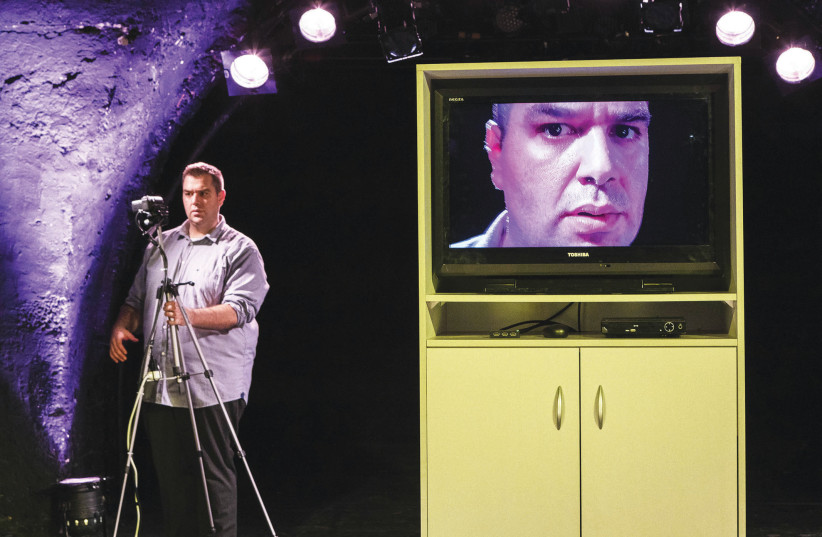Theatergoers will be able to watch the finest independent theater performances from across the land as the Kipod Hazahav (Gold Porcupine) festival kicks off on Sunday, November 6, with The One, an LGBTQ musical about dating and romance shown at Habimah in Tel Aviv, and ending at the same theater on Tuesday, November 15, with the Monster of Memory, a solo performance about an Israeli educator who takes young pupils on Holocaust tours in Poland.
Performances will also held at Tmuna, Malenky, Hasimta and Tzavta theaters in Tel Aviv, as well as at the Dimona theater.
The Gospel by director Ori Vidislavski, a dystopian play about a society in which the fate of artists and performances is harshly judged, will be shown on November 9 and 10.
Vidislavski, who resides in the southern city and serves as the artistic director of its theater, is honored to be shortlisted. “We have worked hard to build here a theater on a state level,” he said, “so this is quite the compliment.”
While he agrees the play is dystopian, he offers that it is also filled with hope.

“Young people today can no longer watch the world trickle through their fingers, otherwise they will have no world left.”
Ori Vidislavski
“Young people today can no longer watch the world trickle through their fingers,” he added, “otherwise they will have no world left.”
The winners will be announced on Friday at Jaffa Theater and the creators awarded the NIS 3,000 Kipod Hazahav prize. “Independent theater in Israel is built on the passion and madness of those who keep it alive,” Vidislavski pointed out. “Creators take loans and mortgage their houses [to finance performances],” he argued.
He added that the state offers a fraction of the support culture gets in other countries, a quarter of a percent from the state budget, compared to 1% in the EU.
“What I want to do, theater which offers an artistic prism through which our lives here are explored, is not rooted in the culture,” the festival’s artistic director Marat Parkhomovsky said.
“This is why I keep hitting the wall hoping it would show some cracks.” He added, “to fight for what I think is important.”
Born in Odessa, Parkhomovsky came here at the age of 10.
“I avoided the role of the Russian and chose to deal with Israeli creators,” he offered, “like Nisim Aloni and Hanoch Levin.”
His efforts gained him praise and criticism. Literature expert Nissim Kalderon lauded his 2021 staging of Are There Cockroaches in Israel? Aloni’s unfinished play and said that until Parkhomovsky he did not believe anyone could stage Aloni’s work except the late playwright himself.
Actor Zeev Shatzki, who saw the rehearsals for the play while Aloni was working on it in 1986, described its richness.
The work includes the Palestinian flag, he noted, but it is used by a professional Jewish-American revolutionary who dreams of a yacht named Stalin, which will carry him off to speak for the wretched of the earth.
Echoing another critic, Michael Handelzalts, who once slammed an Aloni production as wasting public money, critic Nano Shabtai lauded Parkhomovsky as a director and considered his accomplishment as presenting an excellent and rich display of all the flaws in Aloni’s work.

Must high-minded theater be a waste of public money?
The largest theaters in the land, Habima, the Cameri and Beit Lessin, compete for support from the state, Parkhomovsky explained.
The Culture Ministry requests objective yardsticks to parcel out the roughly NIS 30 million it has to give. How many performances were held? How many theaters across the country did the production travel to? This dictates theaters “appeal to the widest Israeli public, which, by definition, cannot be composed of die-hard theatergoers,” Parkhomovsky pointed out.
“I see Kipod Hazahav as a platform through which fringe theater can be a counter-weight to repertory theater,” he said. “We have created a showcase for fringe theater,” Parkhomovsky added, “we present theater productions in front of the audience and say, ‘This is the best from this year, come enjoy.’”
“Fringe theater,” he stated, “puts on stage twice the amount of productions as staged by large theaters.”
One of the shows shortlisted this year is Shmuel, a hip-hop musical about an Israeli man (Neta Weiner, from the hip-hop band System Ali) who commits suicide and ends up in hell where he meets Satan (Ori Yaniv) and Adolf Hitler.
The role fell to Iftach Jeffrey Ophir, who creates such an emotionally compelling (and at times, disturbing) portrait of the Nazi tyrant that patrons stand in line to hug him in his Nazi uniform when they exit Tmuna theater.
Born in Jerusalem, Ophoir spent time in London growing up and discussed his decision to study acting rather than medicine in rapid, London-flavored English.
“I thought, ‘What would make a Neo-Nazi angry?’ A gay Jew playing Hitler!” He laughed, “nobody could touch me!”
He added that “this is Hitler without the racist bloodlust,” a somewhat gay Hitler even, as the play seeks to ask “what if he (Hitler), in hell, understood his sins? What if he asks forgiveness for all eternity? This is a big question and this is what the theater is for.”
“We laugh,” he suggested, “because this play makes us uncomfortable.”
Ophir added that the theater scene in Israel suffers from two other factors. The first factor is that artistic directors are often allowed to remain seated for decades, which means that, talented as they are, they eventually lose touch with the fresh pool of emerging talents. The second factor is that, for him, we live on an island.
“There is no train we can use to visit another country,” he points out.
If in the EU, a citizen can easily explore the theater that is done among neighbors, it would be a rare Israeli who attends a performance of Lenin El-Ramly’s Saadon the Madman, a play about an Egyptian perspective of the Six Days War that was staged in Hebrew here or attend adaptations of the works of Elias Khoury by Rabih Mroué of Lebanon, such as The Journey of Little Gandhi. The novel was translated into Hebrew by Yehouda Shenhav.
“Only innovative, cutting-edge theater will survive,” Ophir concludes, “it has to be dangerous. This will bring young people back to the theater.”
In addition to the theater shows mentioned, the shortlist includes Last Cigarette, Other than this Nothing Took Place, After the End, The Inn, Amok (Based on a Stefan Zweig story), Tziki, Petite Mort, Quanta (a play grounded in physics). HaKowshim Pinat Alenby [Conquers Corner of Allenby], The Game (a chess-inspired theater show), The Sacrifice and Body in the Street.
Tickets range from NIS 70 to NIS 85.
For more information, visit: www.kipodhazahav.co.il to book. All shows are in Hebrew.
